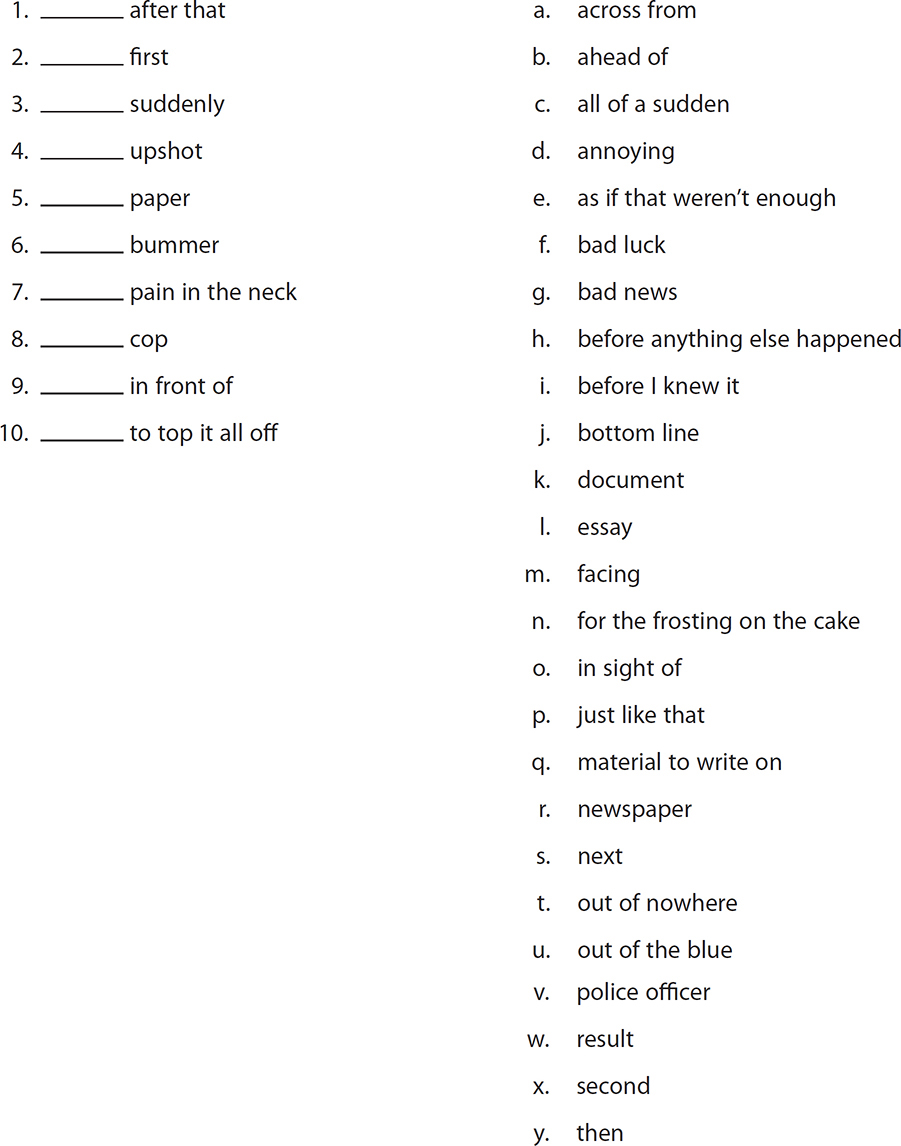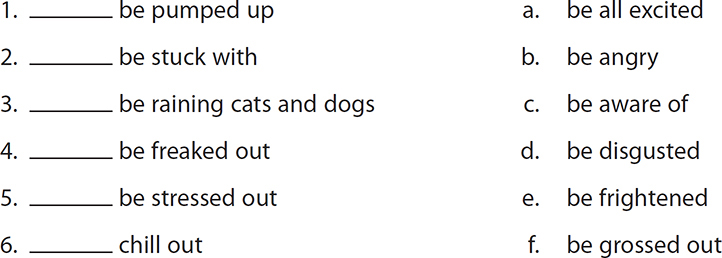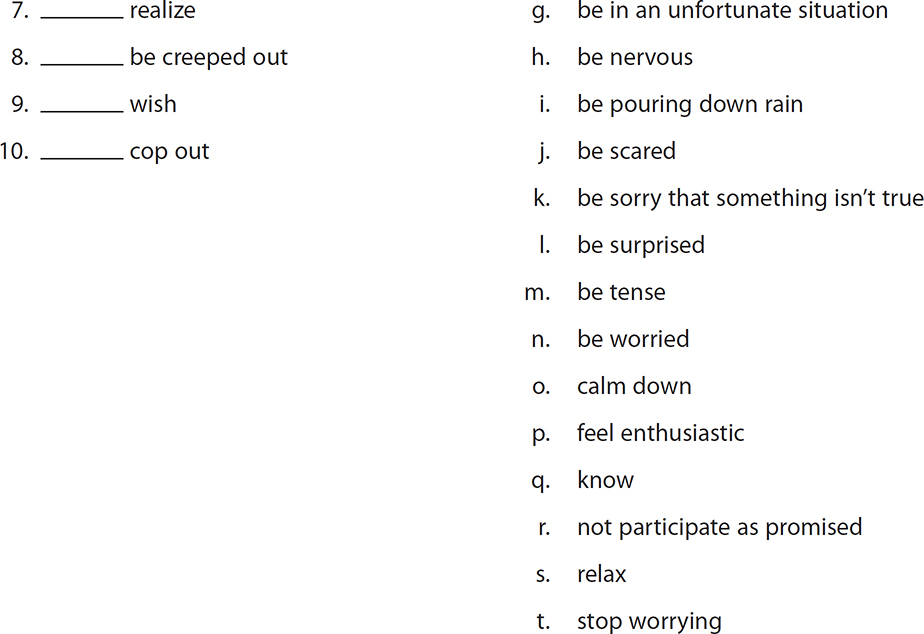Narrating a story
Conversation: A traffic accident
JACK: Hey, buddy, what happened to you? Don’t tell me you broke your leg!
SAM: No, it’s not that drastic. I just twisted my ankle. Still, it hurts a lot, and walking with these crutches is a pain in the neck.
JACK: So when did it happen?
SAM: It was the night of the basketball championship. And the worst thing is that we lost the game and all hopes of winning our title back.
JACK: What a bummer! Sit down here for a minute and tell me all about it.
SAM: Well, it all happened last Thursday. It was pouring down rain and also freezing. I was in a hurry to get to the gym early to chill out a bit before the game. I was all stressed out about the game when I left home, but I got in the car and started to drive toward the gym. All of a sudden my phone rang—it was my girlfriend. She was all excited about the game and wanted to wish me good luck. I started to get pumped up and ready for the game. My girlfriend and I kept on talking when I suddenly realized that the cars in front of me were stopped, and I was going a little fast. I slammed on the brakes, but it was too late. The street was wet, and I hit the car that was stopped in front of me. That hard braking caused me to twist my ankle. I could hardly get out of the car to talk to the other driver because my ankle hurt so much. To tell you the truth, I was so freaked out I didn’t know what to do. I was thinking about the game, my girlfriend, my teammates—it never occurred to me that I wouldn’t be able to play that night. Finally a cop came and made me sign some papers; then an ambulance took me to the hospital. They took some X-rays to see if my ankle was broken or not. Thank goodness it wasn’t broken, but the upshot was that I wasn’t going to play basketball that night. And now I’m stuck with these crutches.
Improving your conversation
The example dialogue is very informal and uses only a few of the traditional markers that indicate the order of events in a narration.
First/second/next/then/after that
In a more formal or longer narration, chronological order can be made clearer with the use of expressions such as first, second, next, then, and after that. The last event in the series is preceded by finally.
First, I got into the car and started to drive toward the gym.
Second, I had an accident.
Then I realized that I had twisted my ankle.
After that, they took me to the hospital.
Finally, I went to the game on crutches and watched my team lose.
Note that each of these expressions is followed by a comma (or pause, when speaking), with the exception of then. Second can be replaced with then, next, or after that, which are interchangeable.
This is what happened at the meeting this afternoon. First, we discussed the budget; second, the chairman announced the new position in Human Services. Next we talked about the problems in Customer Service. After that, we had a short coffee break, and then we had a chance to ask questions. Finally, we adjourned.
Finally
Finally can also indicate relief or joy that something long awaited or expected has happened.
After three long days on the road, I finally got to San Antonio.
Finally you’re here! We expected you two hours ago.
Thank goodness
Thank goodness and thank God are other ways to express relief, joy, or satisfaction.
Thank goodness you arrived safely. Now we can celebrate.
Thank goodness and thank God (but not finally) can also express appreciation.
We have enough money to live on, thank God.
All of the children are healthy, thank goodness.
To top it all off
Sometimes a series of events are meant to tell a convincing story. To top it all off is an expression that is used to introduce a final event that adds weight to the sum of the previous events. Other expressions with the same function are for the frosting on the cake and as if that weren’t enough.
First, my alarm didn’t go off, and I woke up an hour late. Then I spilled coffee all over my suit and had to change clothes. After that, I got in the car and noticed that it was completely out of gas. Finally, I had to wait in a long line to get gas. And to top it all off, when I left the gas station, I was in the middle of a huge traffic jam.
All of a sudden
Events that interrupt a narration can be preceded by all of a sudden, suddenly, before I knew it, out of nowhere, out of the blue, and just like that—all of which mean without warning.
We were enjoying our picnic, when all of a sudden, it began to rain cats and dogs.
They were taking a test, when suddenly the fire alarm went off.
I stepped on a slippery rock, and before I knew it, I was on the ground.
He was driving down the street, and out of nowhere, a car approached from the left.
I was watching TV the other night, when out of the blue I got a call from an old friend whom I hadn’t seen in ages.
I was feeling a little depressed, and just like that, my favorite song came on the radio and cheered me up.
The best thing and the worst thing
The best thing and the worst thing indicate that what follows is the most or least desirable aspect of an issue.
The best thing about this school is that it has wonderful students. They are all eager to learn.
The best thing you can do at this point is be patient.
The worst thing about this apartment is the location. It’s not convenient to anything.
The upshot
The upshot of an issue is its result or outcome. This is often used to avoid telling a complete story or explaining an issue in detail.
I’m not going to give you all the details. The upshot is that Caitlyn has left town and won’t be back.
An expression that has a similar function is the bottom line.

Paper
Paper has a number of meanings. Paper is the most common material used for writing, printing, and cleaning, and it is in many manufactured goods. In this function, it is a non-count noun and is not made plural.
This book is made of paper.
We need to conserve paper in order to protect our forests.
Paper can also be a count noun, and can be made plural, when it means document.
We need to fill out a whole bunch of papers when we go to the doctor.
Paper is also a count noun when it means essay, written composition, or thesis.
I have two research papers to write, so I will probably spend the weekend in the library.
A paper can refer to the newspaper. The paper can mean today’s newspaper.
She went down to the newsstand to buy a paper.
Have you read the paper yet? The news is amazing!
Bummer
A bummer is an item of bad news or bad luck.
Snow again! What a bummer! Now our flight will be canceled.
For serious occasions or tragedies, a shame would be a better expression.
I’m so sorry to hear about your dad’s illness. What a shame!
Pain in the neck
A pain in the neck can refer to anything or any person that is annoying.
I wish my sister would stop banging on the door. She really is a pain in the neck.
I lost my Internet connection again. What a pain in the neck!
Cop
Cop is a slang term that means police officer.
There are cops stationed along the turnpike, waiting for speeders.
To cop out on someone has nothing to do with the police; it means to stop participating in an activity in which other people are counting on you. It indicates that the speaker is unhappy with this decision.
We had five players for the basketball team, but Steve copped out, and now we can’t play a proper game.
Sandy promised to drive me to the game, but he copped out on me at the last minute, so now I’ll have to take the bus.
Pouring down rain
To be pouring down rain means to be raining heavily. An alternative expression is raining cats and dogs.
The kids can’t play outside; it’s pouring down rain.
I had to pull the car off to the side of the road because it was raining cats and dogs.
Pumped up
To be pumped (up) means to be excited. An alternative expression is to be all excited.
We are both pumped up for the concert this weekend.
She is all excited about her date with you. Where are you guys going?
Stressed out
To be stressed out means to be very tense, nervous, or worried about something.
She has two sick children at home and is trying to work at the same time. No wonder she is stressed out!
Another way to express this feeling is to say that something stresses you out.
Having two sick children at home really stresses me out.
Freaked out
To freak out or be freaked out means to be extremely scared, angry, or excited. Also, something can freak you out.
He freaked out when he saw his brother driving his new car.
She is freaked out because she has three exams tomorrow.
That car speeding toward us really freaked me out.
Creeped out
To be creeped out means to be disgusted or frightened by something. Also, something can creep you out.
Those pictures of dead bodies really creeped me out.
It creeps me out that he just sits there and never says a word.
Another way to indicate disgust is to be grossed out.
It really grosses me out when the kids have food fights.
Stuck with
To be stuck with means to have to cope with an uncomfortable or undesirable situation.
My brother went out with his friends, and I’m stuck with looking after my little sister.
Chill out
To chill out means to relax or calm down.

Realize
To realize means to be aware of, to already know.
I’m sorry I yelled at you. I realize that I was wrong.
Wish
To wish means to be sorry that something isn’t true. It is followed by a clause with a subjunctive verb.
[You are not here.] I wish you were here.
[I can’t go with you.] I wish I could go with you.
Wish is also used in formal greetings.
We wish you a happy New Year.
I wish you the best of luck.
To tell you the truth
To tell you the truth precedes information that may surprise the listener.

Too
Too has a number of meanings. It can mean also.
I went home early, and Jon did, too.
It can mean excessively.
She is way too thin. I’m afraid she’s anorexic.
It can mean so extreme that there is a negative result.
He has too much free time. He gets into trouble.
She’s too nice. It creeps me out.
In front of
In front of indicates the location of something in relation to something else. It can mean facing something else.
The teacher sat in a chair in front of her students and read them a story.
It can mean ahead of, facing in the same direction as, something else.
There were three cars in front of mine, waiting for the light.
I had to stand in line, and there were a lot of people in front of me.
It can mean within someone’s eyesight, facing in any direction.
There is a car parked on the street in front of your house.
Fill in each blank with the word or expression (e.g., first, next, then, finally, etc.) that best emphasizes the chronological order of the following sentences.
1. a. _________________, I walked into the classroom. b. _________________ I sat down. c. _________________, I opened my book and started to study. d. _________________, the teacher came in and gave us the test.
2. It was a wonderful day. a. _________________, I had breakfast in bed. b. _________________. I took a long shower and got dressed. c. _________________, my boyfriend came over and took me downtown. We went to two museums and d. _________________ did some shopping. e. _________________, he brought me back home. f. _________________, when I walked in the door, all my friends and family were there to give me a surprise birthday party!
Circle the word or expression that most appropriately completes each sentence.
1. After five years of studying, he _________________ got his degree.
a. just like that
b. suddenly
c. finally
d. after that
2. It’s been dry all summer long, and now, _________________ it’s pouring down rain.
a. thank goodness
b. before you know it
c. the bottom line is
d. to top it all off
3. She was going to help us, but she _________________.
a. was pumped up
b. chilled out
c. copped out
d. realized
4. I wanted to go with them, but I was _________________.
a. all excited
b. a pain in the neck
c. a bummer
d. too late
5. The insects in that horror movie really _________________.
a. creeped me out
b. chilled me out
c. gave me a pain in the neck
d. rained cats and dogs
Match the words and expressions in the first column with those in the second column that have a similar meaning. Note: There may be more than one match for each expression.

Write an appropriate question or remark for each of the following responses. Ask an English-speaking friend to check your answers.
1. ___________________________________________________
What a bummer!
2. ___________________________________________________
He’s a real pain in the neck.
3. ___________________________________________________
Thank goodness, we’re all safe.
4. ___________________________________________________
I finished writing it last night, thank God.
5. ___________________________________________________
Yeah, that’s the bottom line.
6. ___________________________________________________
It was right out of the blue.
Match the words or expressions in the first column with those in the second column that have a similar meaning. Note: There may be more than one match for each expression.


Write an appropriate question or remark for each response. Ask an English-speaking friend to check your work.
1. ___________________________________________________
That really creeps me out.
2. ___________________________________________________
You need to chill out.
3. ___________________________________________________
They copped out on me.
4. ___________________________________________________
I realize that.
5. ___________________________________________________
No wonder you’re stressed out!
Form sentences beginning with I wish to indicate your regret that the previous information is not true.
1. You are not here.
________________________________________________________________
2. I can’t get a promotion at this company.
________________________________________________________________
3. She is always stressed out.
________________________________________________________________
4. He doesn’t know my e-mail address.
________________________________________________________________
5. They never come to see me.
________________________________________________________________
Circle the most appropriate answer for each question or remark.
1. How was your interview?
a. It was pouring down rain.
b. It was the worst thing.
c. It was out of nowhere.
d. To tell you the truth, it stressed me out.
2. What’s the matter?
a. I’m stuck with the job of collecting money.
b. I have a pain in the neck.
c. To tell you the truth, that’s the upshot.
d. The best thing is that she copped out.
3. My dog died yesterday.
a. What a pain in the neck.
b. What a shame.
c. It’s raining cats and dogs.
d. To top it all off, I’m chilling out.
4. Tell me what happened.
a. I’m out of paper.
b. That creeps me out.
c. The upshot is that I’m single again.
d. It’s a good paper.
5. A strange person calls me in the middle of the night and then hangs up.
a. That chills me out.
b. That grosses me out.
c. That creeps me out.
d. That’s a cop-out.
Have you ever been freaked out? Write four or five sentences to describe what happened. Ask an English-speaking friend to check your work.
________________________________________________________________
________________________________________________________________
________________________________________________________________
________________________________________________________________
________________________________________________________________
________________________________________________________________
Write a narration that describes something that happened recently in your life. Use at least eight of the words or expressions explained in this chapter. Ask an English-speaking friend to check your work.
________________________________________________________________
________________________________________________________________
________________________________________________________________
________________________________________________________________
________________________________________________________________
________________________________________________________________
________________________________________________________________
________________________________________________________________
________________________________________________________________
________________________________________________________________
________________________________________________________________
________________________________________________________________










